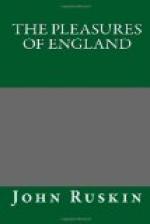“To those who have eyes to read it,” says Mr. Muir, “the name ‘Melrose’ is written full and fair, on the fair face of all this reach of the valley. The name is anciently spelt Mailros, and later, Malros, never Mulros; (’Mul’ being the Celtic word taken to mean ’bare’). Ros is Rose; the forms Meal or Mol imply great quantity or number. Thus Malros means the place of many roses.
“This is precisely the notable characteristic of the neighbourhood. The wild rose is indigenous. There is no nook nor cranny, no bank nor brae, which is not, in the time of roses, ablaze with their exuberant loveliness. In gardens, the cultured rose is so prolific that it spreads literally like a weed. But it is worth suggestion that the word may be of the same stock as the Hebrew rosh (translated ros by the Septuagint), meaning chief, principal, while it is also the name of some flower; but of which flower is now unknown. Affinities of rosh are not far to seek; Sanskrit, Raj(a), Ra(ja)_ni_; Latin, Rex, Reg(ina).”
I leave it to Professor Max Muller to certify or correct for you the details of Mr. Cockburn’s research,[11]—this main head of it I can positively confirm, that in old Scotch,—that of Bishop Douglas,—the word ‘Rois’ stands alike for King, and Rose.
[Footnote 11: I had not time to quote it fully in the lecture; and in my ignorance, alike of Keltic and Hebrew, can only submit it here to the reader’s examination. “The ancient Cognizance of the town confirms this etymology beyond doubt, with customary heraldic precision. The shield bears a Rose; with a Maul, as the exact phonetic equivalent for the expletive. If the herald had needed to express ’bare promontory,’ quite certainly he would have managed it somehow. Not only this, the Earls of Haddington were first created Earls of Melrose (1619); and their Shield, quarterly, is charged, for Melrose, in 2nd and 3rd (fesse wavy between) three Roses gu.




